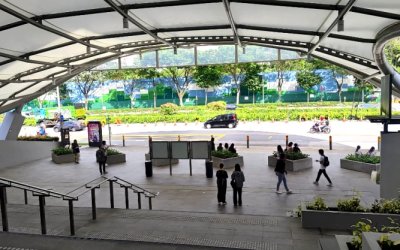如此, 我相信……
In this way, I believe that all the people may be able to enjoy the bus ride like me.
如此, 我相信大家或許能夠像我一樣, 享受乘坐公共汽車的樂趣。
3. Only with combined efforts, can we ...
唯有通力合作, 我們才能……
Only with combined efforts, can we expect our hometown take on a new look in due course.
唯有通力合作, 我們才能期望我們的家鄉不久會有新的面貌。
4. For these reasons, I ...
基於這些理由, 我……
For these reasons, I think that receiving college education in China is wise.
基於這些理由, 我認為在中國接受大學教育是明智的。

5. In conclusion, ...
=To sum up, ...
總而言之, ……
In conclusion, a good citizen should observe traffic regulations.
總而言之, 好公民應該遵守交通規則。
6. We can, therefore, come to the conclusion (that)...
因此, 我們可以得出如下個結論
We can, therefore, come to the conclusion that nothing is so precious as peace in the world.
因此, 我們能下個結論, 那就是世上和平最珍貴。
7. If we can do as mentioned above, there can be no doubt (that)...
如果我們能做到如上所述, 毫無疑問地……
If we can do as mentioned above, there can be no doubt that we can master English.
如果我們能做到如上所述, 毫無疑問地, 我們就能精通英語。
8. Therefore, we should realize (that)...
所以, 我們應該意識到……
Therefore, we should realize that in learning English we can not do without a dictionary.
所以, 我們應該意識到學英文不能沒有詞典
9. We, therefore, can make it clear from the above discussion (that)...
因此, 由上面的討論我們可以明白……
We, therefore, can make it clear from the above discussion that perseverance can overcome any difficulty.
因此, 由上面的討論我們可以明白, 堅持不懈可以克服任何困難。
第四組
1. Nothing is +-er than to do
沒有比……更重要的了
Nothing is more important than to receive education.
沒有比接受教育更重要的事。
2. There is no doubt that ...
毫無疑問……
There is no doubt that honesty still plays a very important role in public morality.
毫無疑問, 誠實在公共道德方面依然起著重要作用。

3. There is no one but ...
沒有人不……
There is no one but longs to go to college.
沒有人不渴望上大學。
4. spare no effort to do
不遺餘力地……
We should spare no effort to beautify our environment.
我們應該不遺餘力的美化我們的環境。
5. be closely related to ...
與……息息相關
Taking exercise is closely related to health. 做
運動與健康息息相關。
6. due to/owing to/thanks to ...
因為……
Thanks to his encouragement, I finally realized my dream.
因為他的鼓勵, 我終於實現我的夢想。
一篇優秀的作文
結尾是很重要的
再次陳述主題
用 paraphrase 方式再次呈現主題陳述中出現的三要素: a.問題中存在爭議的地方; b.觀點;c.理由。
結束句
通常放在陳述完主題之後。
結尾段結束句的三種常見寫法
作文的最後總結教訓或提出建議
In conclusion, whether to imitate or vary from others to achieve success, it hinges mostly on the occupations we engage in. For jobs like doctors that require routine practices, it is unnecessary for them to make alterations to become successful. Whereas artists like painters whose works are characteristic of creativity and imagination, it is of crucial importance to distinguish from others to succeed.
提出問題留待讀者思考
In conclusion, it is inevitable for children to commit mistakes at a young age, parents should play their part to instill the importance of good behaviors in their children. Parents should allow children to make small mistakes as a meaningful learning experience. However, what would be like if parents permit their children to commit serious mistakes like theft and robbery?

提出令人憂慮的結果
或可能出現的負面結果
假設讀者沒有想作者說的那樣去做,在結論中提出將會出現的負面結果,幫助讀者預見到令人憂慮的後果,進而令讀者自然第接受作者的意見。
e.g., To summarize, on one hand, for artists who are fortunate to profit immensely from their occupation, it is unnecessary for the government to offer additional financial incentives for them. On the other hand, government should provide financial support and appropriate policies to impoverished artists who engage in conventional craftsmanship because these are viewed as national treasure and cultural heritage of the country. If the government did not support those unfortunate traditional artists, the valuable conventional forms of arts would disappear very soon.
結尾段常用表達方式
Finally, thus, in a word, in brief;
In conclusion, to conclude, in the end;
In the final analysis, in a nutshell, on the whole;
To summarize, to encapsulate, in sum, in summary
In light of these facts, considering these ideas

遇到生詞怎麼辦
生詞寶典告訴你
詞彙高頻前綴
1.表示時間概念的高頻前綴:ex- pre- pro- re-
2. 表示位置概念的高頻前綴:inter- out- over- sub- super- transunder-
3. 表示程度概念的高頻前綴:bi- di- centi- milli- mono- multi-
4. 表示方式概念的高頻前綴:auto- co- mal- mis- self-
5. 表示態度概念的高頻前綴:anti- counter- pro-
6. 表示否定概念的高頻前綴:ab- an- de- sid- in- non- un-

詞彙高頻後綴
1.動詞的高頻後綴:-ate -ish -ify -ch -en -ize -ise
2. 名詞的高頻後綴:-or -ee -ess -an -ian -ance -ant -ity -ary
-um -age -let -try -ness -al -ese -hood -ice -ion
-ism -ist -ment -ship -th
3. 形容詞的高頻後綴:-al -tle -tive -id -que -ous -less -able
-free -ful -ic -like -some -y
4. 副詞的高頻後綴:-ward -ly -wise
詞源變化規則介紹
1.元音字母替換,單詞含義不變或有細微變化:a e i o u y























